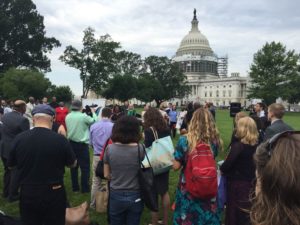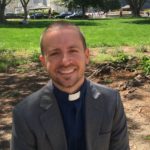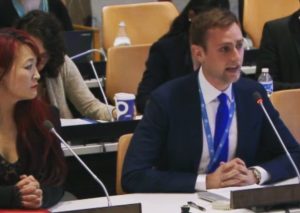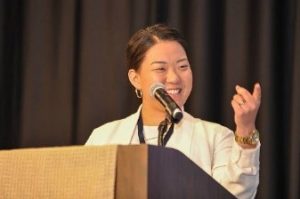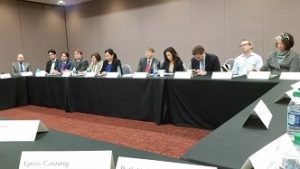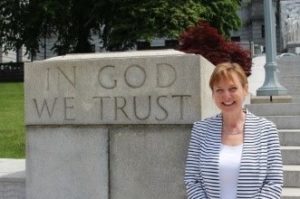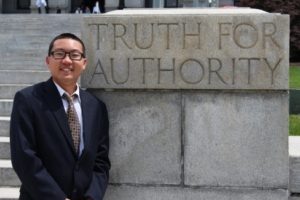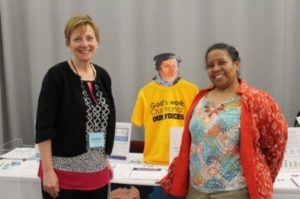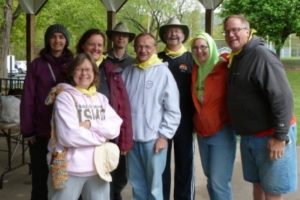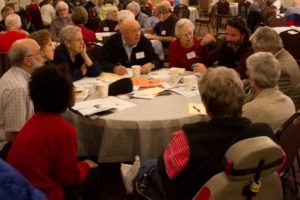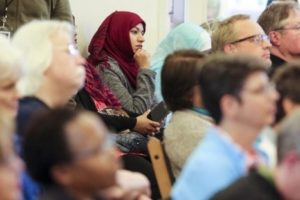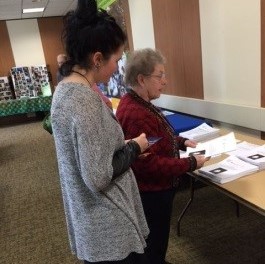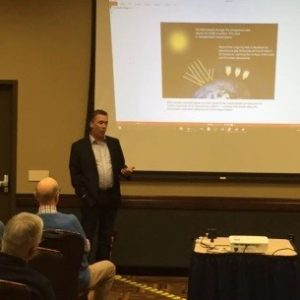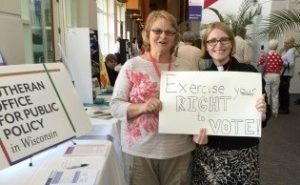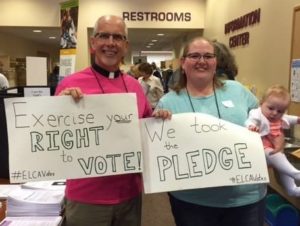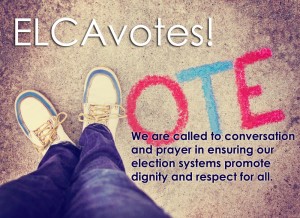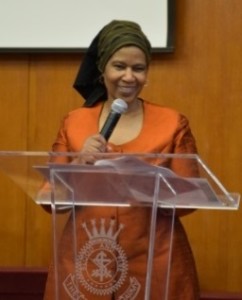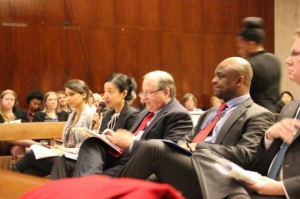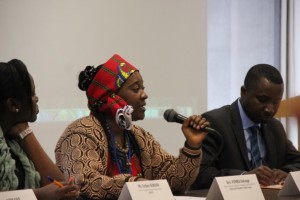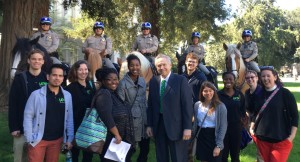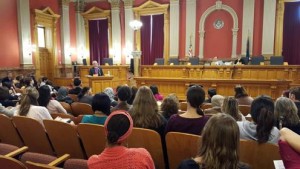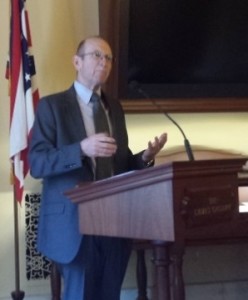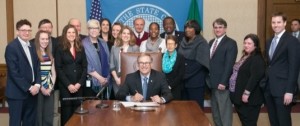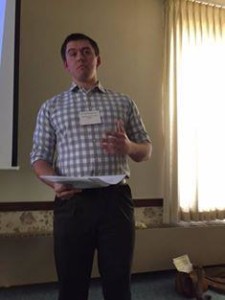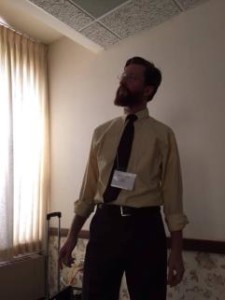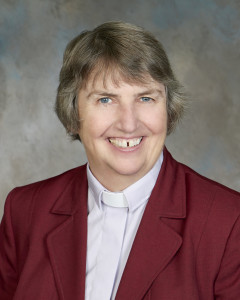Lutherans are taking action across the country! Below you will find our monthly State Advocacy Newsletter. Share with your friends!
____________________
Washington, D.C. – Amy Reumann, Director of Advocacy
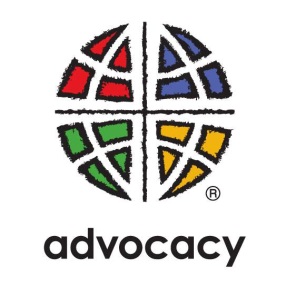
CONGRESS TAKES STEPS THAT COULD SET BACK CHILD NUTRITION PROGRAMS: The ELCA is committed to fighting childhood hunger. That commitment, rooted in the baptismal call to care for our neighbors in need, is why we as a church have advocated for a strong renewal of the child nutrition programs that are critical to the health and well-being of children and families throughout our nation. The House last month introduced a new version of the child nutrition re-authorization bill (Improving Child Nutrition and Education Act of 2016). ELCA Advocacy strongly opposes this legislation because it would roll back years of progress made by our nation’s child nutrition programs. The bill is in the House Education and Workforce Committee. Click here to read our action alert urging Congress to improve these programs.
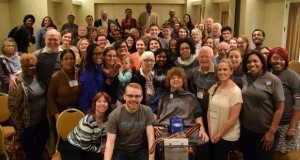 ELCA ACTIVELY INVOLVED IN ECUMENICAL ADVOCACY DAYS: Christian advocates from across the country gathered in Washington D.C. for Ecumenical Advocacy Days (EAD), April 15-18. For the 14th annual gathering, the EAD theme was “Lift Every Voice – Racism, Class and Power.” As part of the ELCAvotes initiative, ELCA Advocacy, Racial Justice Ministries, and Young Adult Ministries brought 16 participants from 12 states to EAD to serve as ELCAvotes ambassadors. These leaders are now taking the information they learned from EAD back to their communities. The ELCA also supported the participation of 17 young adults in EAD this year. The weekend concluded with a day of action, where attendees visited the offices of their senators and representatives, advocating on two key issues: “supporting the Voting Rights Advancement Act of 2015 as a substantial legislative step to restoring and strengthening the Voting Rights Act of 1965” and “defeating the Trans-Pacific Partnership trade agreement that deepens inequality and prioritize corporate interest over both God’s creation and people, especially vulnerable communities in the U.S. and abroad.” ELCA staff from ELCA Global Mission and Domestic Mission units attended, including staff from Lutheran Office for World.
ELCA ACTIVELY INVOLVED IN ECUMENICAL ADVOCACY DAYS: Christian advocates from across the country gathered in Washington D.C. for Ecumenical Advocacy Days (EAD), April 15-18. For the 14th annual gathering, the EAD theme was “Lift Every Voice – Racism, Class and Power.” As part of the ELCAvotes initiative, ELCA Advocacy, Racial Justice Ministries, and Young Adult Ministries brought 16 participants from 12 states to EAD to serve as ELCAvotes ambassadors. These leaders are now taking the information they learned from EAD back to their communities. The ELCA also supported the participation of 17 young adults in EAD this year. The weekend concluded with a day of action, where attendees visited the offices of their senators and representatives, advocating on two key issues: “supporting the Voting Rights Advancement Act of 2015 as a substantial legislative step to restoring and strengthening the Voting Rights Act of 1965” and “defeating the Trans-Pacific Partnership trade agreement that deepens inequality and prioritize corporate interest over both God’s creation and people, especially vulnerable communities in the U.S. and abroad.” ELCA staff from ELCA Global Mission and Domestic Mission units attended, including staff from Lutheran Office for World.
THE GLOBAL FOOD SECURITY ACT ADVANCES: Both chambers of Congress passed their versions of the Global Food Security Act, a top priority of ELCA Advocacy. Congress must now reconcile the two bills and send the final legislation to the president to sign. Our advocacy will continue to ensure that a final bill will be sent to the president’s desk by the end of this year. The bill provides congressional authorization to Feed the Future, a U.S. government initiative charged with combating chronic hunger and food insecurity around the world. It ensures that every dollar spent accrues value in global productivity, expands opportunities for education, reduces violence and helps those who suffer from food scarcity. Through Feed the Future, countries are able to increase agricultural and nutritional investments. As a result, farmers are able to feed their families, communities, and can contribute to their countries’ economic growth.
CONGRESS PASSES OLDER AMERICANS ACT: Last month, President Obama signed the Older Americans Act into law. The Older Americans Act is a critical piece of legislation that authorizes supportive services for older adults through Area Agencies on Aging, family caregiver supports, nutrition programs and the Senior Community Service Employment Programs. The re-authorization of the act was a priority for ELCA Advocacy and Lutheran Services in America since it was allowed to expire in 2015. ELCA Advocacy promoted this legislation by collecting nearly 500 postcards written to Congress from Lutherans.
____________________
New York, NY – Dennis Frado, Lutheran Office for World Community
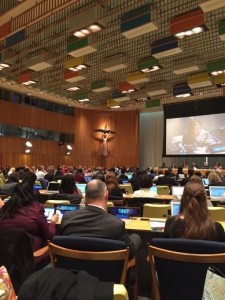
CIVIL SOCIETY HEARING ON HIV AND AIDS: On April 6, the Lutheran Office for World Community (LOWC) participated in the Civil Society Hearing on HIV and AIDS. This hearing is the principal platform for civil society to influence the United Nations Political Declaration on HIV and AIDS, which is being proposed for adoption in June. Throughout the entirety of the hearing, common themes emerged: 1) the AIDS response must be fully funded by governments, particularly those of high-income countries, 2) barriers to the right to health by key populations must be addressed and alleviated, 3) trade rules must continue to ensure access to affordable, high-quality medicines for people living with HIV and AIDS, and 4) that stigma against people living with HIV and AIDS, as well as stigma against key populations, must be addressed and eliminated.
A number of those present at the hearing stressed that ending gender-based violence and ending the AIDS epidemic should not be in competition with each other but rather be complimentary campaigns. This reinforced the common belief that gender equality is an essential response to the AIDS epidemic. Furthermore, the Ecumenical Advocacy Alliance, now a part of the World Council of Churches, made an intervention during the hearing, calling for further partnerships with faith-based organizations in the AIDS response. They also urged action on five priority areas, which can be found here.
LOWC will continue to follow meetings and events related to HIV and AIDS, including the meeting on HIV and AIDS June 8-10 and the International AIDS Conference in July.
U.S., PALESTINIAN LUTHERAN CHURCH LEADERS JOIN OTHER PALESTINIAN CHURCH LEADERS IN TAKING ATLANTA SUMMIT MESSAGE TO WASHINGTON: On April 21, ELCA Presiding Bishop Elizabeth Eaton joined Bishop Munib Younan of the Evangelical Lutheran Church in Jordan and the Holy Land;, Fouad Twal, the Latin patriarch of Jerusalem; Suheil Dawani, archbishop of the Episcopal Diocese of Jerusalem; and several others of the Palestinian delegation who came to Washington after the “Pursuing Peace and Strengthening Presence: The Atlanta Summit of Churches in the USA and the Holy Land” meeting.
The group briefed U.S. Rep. Chris Stewart, R-Utah, and the staff of other members of the House of Representatives about the summit and discussed the general situation of the churches and Christians in the Holy Land and the Middle East.
The delegation also visited the White House and met with Colin Kahl, deputy assistant to the president and national security adviser to the vice president, and Yael Lempert, special assistant to the president and senior director for the Levant, Israel and Egypt at the National Security Council. The delegation gave them a letter to the president and a copy of the Atlantic Summit Document. The delegation highlighted the importance of education, the need to fight extremism and radicalism, the centrality of Jerusalem to peace. They also gave an update on their educational, health and other diaconal work.
Younan expressed thanks for U.S. Secretary of State John Kerry’s negotiating effort despite the disappointing results. He asked the administration to support the French-organized Middle East peace conference to be held next month and urged the U.S. to refrain from using its veto on Israel-Palestine resolutions in the U.N. Security Council. He asked that the U.S. make reunification of families a priority. He also expressed thanks for U.S. support for the East Jerusalem hospitals, including Augusta Victoria Hospital, operated by The Lutheran World Federation.
On April 22, the delegation met at the State Department with Shaun Casey, special representative for religion and global affairs; Rachel Leslie, an adviser in Casey’s office; Stephen Butler, deputy director of the Office of Israel and Palestinian Affairs; and Michael D. Yaffe, senior adviser in the office of the special envoy for Israeli-Palestinian negotiations.
Younan expressed appreciation for the interaction with Casey in recent years and said the churches’ relationships with the U.S. consul general in Jerusalem, Donald Blome, and U.S. Ambassador Daniel Shapiro in Tel Aviv are good and “very meaningful.” Bishop Younan reiterated his wish that the U.S. give priority to consulting with the Palestinian church leaders, particularly on the peace negotiations. He is frustrated that the Israel-Palestine issue now appears to be “on the back burner,” whereas, if it were solved, it could help solve some of the other more publicized issues, such as the conflicts in Syria and Iraq.
____________________
California – Mark Carlson, Lutheran Office of Public Policy
FIRST CALL THEOLOGICAL EDUCATION, REGION 2: Although LOPP-CA Director Mark Carlson was in Chicago at the annual staff meeting of the Domestic Mission unit, he helped arrange for a Day at the Capitol for new rostered leaders, part of their focus on public witness. They were welcomed by Assembly member Sebastian Ridley-Thomas of Los Angeles, secretary of the Legislative Black Caucus, chair of the Revenue and Taxation Committee, chair of the California Prayer Breakfast, and the youngest member of the Legislature. LOPP-CA also arranged for the group of more than 50 to meet with a member of a congregational church council whose “ministry in daily life” is serving as communications director for the Senate chair of the Legislative Women’s Caucus. She briefed the group on 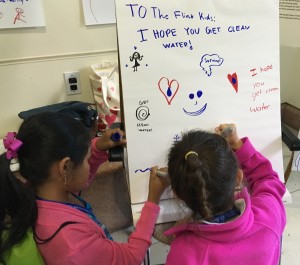 caucus priorities, such as child care and family leave. Carlson had breakfast with the group upon returning, using his brief time to push Gov. Jerry Brown’s sentencing reform initiative and the initiative to end the death penalty.
caucus priorities, such as child care and family leave. Carlson had breakfast with the group upon returning, using his brief time to push Gov. Jerry Brown’s sentencing reform initiative and the initiative to end the death penalty.
DIRECT DEMOCRACY: Signatures have been submitted for the death penalty initiative, which would move more than 700 men and women on death row to the status of life without parole. This initiative has been endorsed by the LOPP-CA Policy Council. LOPP-CA has been active in the final effort for signatures for the sentencing reform measure.
EARTH DAY: LOPP-CA was asked by the state water boards to have a display for faith groups at the CalEPA Festival, when employees of various agencies brought their families to their high-rise workplace. Children wrote notes of encouragement on easel pads to children in Flint, Mich., (c/o Salem Lutheran).
Colorado – Peter Severson, Lutheran Advocacy Ministry Colorado
LEGISLATIVE UPDATE: The Colorado General Assembly will meet until May 11, which means that Lutheran Advocacy Ministry-Colorado priorities have several more days to move through the legislative process. Our remaining major priorities include SB 190, a bipartisan bill from the Joint Budget Committee that will improve public services, particularly food assistance programs, by incentivizing better administrative practices and hiring additional state-level staff to increase enrollment of eligible families. Colorado currently ranks 45th in the nation for timeliness and accuracy in delivering food assistance, and Colorado merchants lose out on an estimated $686 million annually in grocery sales from unenrolled households. Another priority bill is HB 1227, a bipartisan bill that creates accommodations for low-income parents receiving child care assistance. A final bill is SCR 006, which would strike the exception to slavery and involuntary servitude from the state constitution (Article II, section 26). This resolution passed the Senate on a 35-0 vote, and if it passes the House, will be referred to Colorado voters on the fall ballot.
CHURCHWIDE CONNECTIONS: The directors of all ELCA-connected state advocacy offices gathered in Chicago for the churchwide Domestic Mission unit meeting in April. It was a time of fellowship and networking with churchwide colleagues. It gave our advocacy office directors the chance to share updates and best practices and to celebrate one another’s accomplishments for the sake of our common calling to public policy justice.
____________________
New Mexico – Ruth Hoffman, Lutheran advocacy Ministry New Mexico
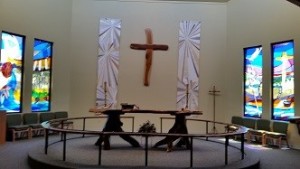
The LAM-NM director traveled to Las Cruces, which is near the Mexican-Texan border, to do a presentation at Peace Lutheran Church about advocacy ministry and the 2016 LAM-NM Advocacy agenda. Advocates from Peace Lutheran have been active in our ministry since 1984. This congregation is engaged in their community, state and the world!
The Lutheran Advocacy Ministry-New Mexico Policy Committee recently met in Albuquerque at St. Timothy Lutheran Church. Four new members were welcomed to the committee from four ELCA congregations. The committee heard reports about the recently completed legislative session, evaluated the 2016 Bishop’s Legislative Luncheon & Issues Briefing, and reviewed financial reports and program activities. Time was spent planning for the fall advocacy conference on Nov. 5 when Rozella White, ELCA director of Young Adult Ministry, will be the keynote speaker.
____________________
Ohio – Nick Bates, The Faith Coalition for the Common Good
It’s been a relatively light legislative spring around the Statehouse. Gov. John Kasich delivered his State of the State address in Marietta on April 6, with fewer policy proposals compared to his previous addresses. A new report released addresses some of the realities in Ohio. It highlights outcomes related to the health, economy, education and inequality in Ohio.
CAPITAL EXPENDITURES: The Ohio capital budget increases resources for infrastructure. While this is a positive step, many needs remained unmet. For example, the state has not invested adequately to help farmers in northwest Ohio protect the streams, rivers and Lake Erie. The state has invested in lead contamination notification but still has not invested in lead removal.
RENEWABLE ENERGY STANDARDS: Ohio’s renewable energy standards previously had overwhelming bi-partisan support. However, in 2014, they were temporarily suspended over the protests of Lutheran leaders. A bill was announced in mid-April to expand the temporary freeze until 2019. Renewable energy is a growing job sector in Ohio that this freeze hurts.
PREGNANCY PROTECTION ACT: Faith leaders have won the support of every female state senator to pass a bill to end discrimination against pregnant women in Ohio. The bill had its first committee hearing the week of April 18.
MEDICAID CHANGES: A new plan, if approved, would undercut the positive steps Ohio has made toward health care access for the most vulnerable. The plan would require the poorest Ohioans to start paying for Medicaid. Experts estimate that 140,000 Ohioans would likely lose coverage under the new rules.
____________________
Pennsylvania – Tracey DePasquale, Interim-Director
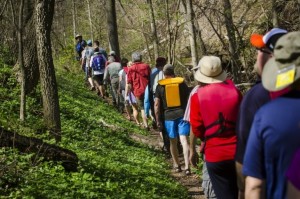
LAMPa partnered with ELCA Global Mission and the Lutheran Theological Seminary at Gettysburg for two days of worship, service, learning and advocacy on April 17 and 18, focused on the theme “Stirring the Waters: Faith, Science and Action!”
Sunday’s events featured outdoor learning, service, an interfaith blessing of the waters and a meal, music and climate-change lecture in the Capitol rotunda. All events were open to the public. More than 150 people participated in the day’s events, which focused on our mutual call to care for the earth that sustains all of us. Highlights included tree- planting that kicked off a Reformation service-and-advocacy project and a canoe trip led by Cindy Adams Dunn, secretary of the Department of Conservation and Natural Resources. Lutheran Camping Corp. supplied canoes, recruiting and staff for that event.
planting that kicked off a Reformation service-and-advocacy project and a canoe trip led by Cindy Adams Dunn, secretary of the Department of Conservation and Natural Resources. Lutheran Camping Corp. supplied canoes, recruiting and staff for that event.
The second day featured workshops and advocacy training around a variety of topics, with a special focus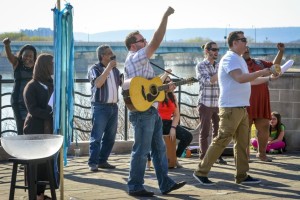 on the links between science and the issues on which we advocate. The event was an official part of the seminary’s Spring Academy Week. The day also featured a celebration of advocacy successes and recognition of advocates from each of Pennsylvania’s seven synods. Click here to learn more.
on the links between science and the issues on which we advocate. The event was an official part of the seminary’s Spring Academy Week. The day also featured a celebration of advocacy successes and recognition of advocates from each of Pennsylvania’s seven synods. Click here to learn more.
We also unveiled a sample of a video on making advocacy known among our congregations. The video features advocates telling their stories, as well as an introduction by Lutheran Theological Seminary at Philadelphia theologian and LAMPa policy council member the Rev. Dr. John Hoffmeyer.
____________________
Southeastern Synod – Hilton Austin Jr., Georgia
haustin337@att.net
As we approach our one-year anniversary with our upcoming Synod Assembly, I can only say it has been an interesting and busy year, never a dull moment. Thanks go out to John Johnson and the folks in the Washington, D.C., office for their help and guidance and especially to all of those folks across our synod who participated in rallies, marches and events, along with those who helped coordinate and publicize those events.
Currently, we are making preparations for the Synod Assembly at the end of May. We will have an exhibit table outside the Plenary Hall to talk to folks about the importance of our work and our need for advocacy coordinators in each congregation. On Saturday, we will present an immigration advocacy workshop and host an advocacy luncheon.
In April, we published the first edition of an e-newsletter; it will be published three times a year, September, January and April. September will be the Discernment Edition to set priorities for the upcoming legislative season. January will be the Action Edition with current pending legislation and Lobby Days dates. April will be the Wrapup Edition.
We are very excited about the current ongoing conversation with Presbyterians for a Better Georgia and the Episcopal Diocese of Atlanta concerning working together and also opening an ecumenical advocacy office in Atlanta. We plan to have the office in our synod office, from which we will also be able to help coordinate and support advocacy efforts in Tennessee, Alabama and Mississippi.
____________________
Virginia – Kim Bobo, Virginia Interfaith Center for Public Policy
Neill Caldwell, Communications Director
In the last few weeks, Virginia Interfaith Center for Public Policy staff members have been listening to fellow citizens and activists talk about health care access in Virginia and some Virginia legislators explain why they oppose expanding coverage in the Commonwealth by taking federal dollars allocated under the Affordable Care Act to pay for expansion. Sen. Amanda Chase, R-VA11, thinks that a concierge-medicine approach is preferable to coverage expansion under the Affordable Care Act.
Virginia Consumer Voices for Healthcare, the health care advocacy arm of VICPP, was invited to participate in an NAACP event in Richmond, #HealthcareMatters. The panel discussion was moderated by Community Outreach Coordinator Cassandra Shaw, with the Rev. Marlon Haskell of Chicago Avenue Baptist Church, NAACP Richmond Health Committee Chair Marilyn Campbell, motivational speaker and clinical social worker Germika Pegram, and community activist Christopher Green joining the panel. The panel, and the attendees, agreed that community action was the only way to shift thinking in the General Assembly on the importance of closing the coverage gap via access to quality, affordable health care for all Virginians.
For National Minority Health Month (April), Virginia Consumer Voices for Healthcare and the Virginia Interfaith Center are partnering with African American faith organizations/judicatories and churches to make a unified, faith-based push to compel their state leaders to close the coverage gap. They’re also working with two nationally known African American faith leaders, the Rev. William Barber and Dr. James Forbes, on the Richmond leg of their 19 city “Repairers of the Breach” revival tour.
____________________
Washington – Paul Benz, Faith Action Network
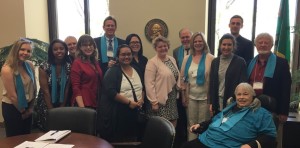
ANNUAL VISIT TO NATION’S CAPITOL FOR ECUMENICAL ADVOCACY DAYS: Office visits were made to 11 of our 12 congressional offices (we met three members of congress; the rest were staff). The key issues we discussed included child nutrition, opposing block granting of SNAP, support for voting-rights bills, opposition to the Trans-Pacific Partnership, and support of funding for the Augusta Victoria Hospital in East Jerusalem. Faith Action Network also made visits to our friends at the National Council of Churches, the Friends Committee on National Legislation, and the Interfaith Criminal Justice Coalition convened by the United Methodist Church. Our state delegation was made up of many young adults, and we participated in the marches and rallies on Capitol Hill that day.
Highlights from Ecumenical Advocacy Days include preaching and leadership from the Rev. William Barber of North Carolina, as well as being with people of faith from around the country advocating on social justice issues with the theme: “Lift Every Voice! Racism, Class and Power.”
Faith Action Network is now working on our four regional summits during May and June in Seattle, Spokane, Vancouver and Yakima. At those events, we will organize by our issue work groups, such as economic justice, environment, criminal justice and health care.
ELCAVOTES: We are also promoting ELCAvotes at our synod assemblies, encouraging congregations and members to get engaged in this year’s elections, as well as introducing resolutions to Repudiate the Doctrine of Discovery, which is an act of solidarity with our Native American brothers and sisters, and acknowledges white privilege.
____________________
Wisconsin – Cindy Crane, Lutheran Office for Public Policy in Wisconsin
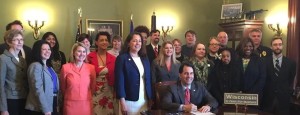
CEREMONIAL SIGNING: A significant anti-sex trafficking bill that LOPPW supported has become law. Bishop Mary Froiland, LOPPW Advisory Council member the Rev. Barb Girod, and the director attended the ceremonial event in Madison. LOPPW volunteer Robbie Joern attended the actual signing in Hudson.
NEW STATE CLIMATE TABLE: LOPPW was part of an all-day organizing meeting for an emerging Wisconsin Climate Table to broaden the efforts of secular and faith-based organizations to support a Clean Power Plan and other healthy environmental efforts in Wisconsin.
TWO NEW 2016 RESOURCES:
- Human Trafficking – What does the church have to say? A new resource for congregations to use with youth and adults.
- Money & Politics: The Gradual Distortion of American Politics and its Impact on Poverty – What does the church have to say? We also have a one-page summary of the longer Money & Politics. Go to loppw.org/resources/. Thank you to our former intern, Genevieve Baldwin, for her work on 2016 LOPPW anti-human trafficking resource and to intern Kyle Kretschmann for his work on the money and politics resource.
____________________
What advocacy efforts are going on in your synod or state? We want to hear about it!

